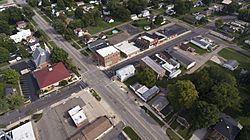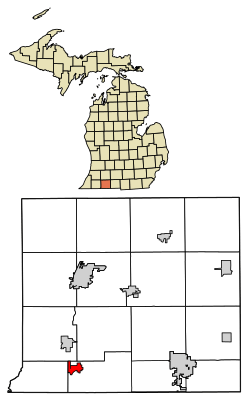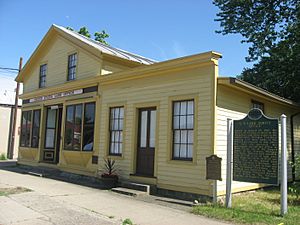White Pigeon, Michigan facts for kids
Quick facts for kids
White Pigeon, Michigan
|
|
|---|---|
|
Village
|
|

Aerial photo of White Pigeon facing South East
|
|

Location of White Pigeon, Michigan
|
|
| Country | United States |
| State | Michigan |
| County | St. Joseph |
| Area | |
| • Total | 1.43 sq mi (3.69 km2) |
| • Land | 1.41 sq mi (3.65 km2) |
| • Water | 0.02 sq mi (0.04 km2) |
| Elevation | 817 ft (249 m) |
| Population
(2020)
|
|
| • Total | 1,718 |
| • Density | 1,219.30/sq mi (470.72/km2) |
| Time zone | UTC-5 (Eastern (EST)) |
| • Summer (DST) | UTC-4 (EDT) |
| FIPS code | 26-86920 |
| GNIS feature ID | 1625017 |
White Pigeon is a small village located in St. Joseph County, Michigan. In 2020, about 1,718 people lived there. It is located within White Pigeon Township and is very close to Michigan's border with Indiana.
Contents
About White Pigeon
Where is White Pigeon?
White Pigeon covers about 1.4 square miles (3.6 square kilometers). Most of this area is land, with a small part being water. The Pigeon River flows through the southern part of the village. This river eventually joins the St. Joseph River, which then flows into Lake Michigan.
Getting Around White Pigeon
Main Roads
Two important highways, ![]() US 12 and
US 12 and ![]() US 131, pass through or near White Pigeon. These roads help people travel to and from the village.
US 131, pass through or near White Pigeon. These roads help people travel to and from the village.
Trains
White Pigeon is also a hub for trains. The Michigan Southern Railroad has its main train yard here. The Grand Elk Railroad also operates to the west of town.
History of White Pigeon
White Pigeon was officially established by European Americans in 1837. The United States Land Office, located in downtown White Pigeon, is the oldest surviving U.S. Land office in Michigan. In the 1830s, the U.S. government sold over 250,000 acres of land in Michigan to settlers. This happened after Native American tribes in the area agreed to give up their lands.
How White Pigeon Got Its Name
The town is named after a local Potawatomi chief named Wahbememe. His name means "White Pigeon." Chief Wahbememe was buried in the town, and a special memorial stone marks his grave. This gravesite is now listed on the National Register of Historic Places.
The Legend of Chief White Pigeon
There is a famous story about Chief Wahbememe. Legend says that while he was at a meeting of chiefs in Detroit, he heard about a plan to attack the settlement that is now White Pigeon. Chief Wahbememe was a friend to the white settlers and wanted to protect them. He ran almost 150 miles back to the settlement to warn the people. After running such a long distance and giving his warning, he collapsed and sadly died from exhaustion.
Population of White Pigeon
| Historical population | |||
|---|---|---|---|
| Census | Pop. | %± | |
| 1860 | 959 | — | |
| 1870 | 922 | −3.9% | |
| 1880 | 1,021 | 10.7% | |
| 1890 | 961 | −5.9% | |
| 1900 | 705 | −26.6% | |
| 1910 | 667 | −5.4% | |
| 1920 | 887 | 33.0% | |
| 1930 | 966 | 8.9% | |
| 1940 | 1,017 | 5.3% | |
| 1950 | 1,113 | 9.4% | |
| 1960 | 1,399 | 25.7% | |
| 1970 | 1,455 | 4.0% | |
| 1980 | 1,478 | 1.6% | |
| 1990 | 1,458 | −1.4% | |
| 2000 | 1,627 | 11.6% | |
| 2010 | 1,522 | −6.5% | |
| 2020 | 1,718 | 12.9% | |
| U.S. Decennial Census | |||
In 2020, the population of White Pigeon was 1,718 people.
Famous People from White Pigeon
- John S. Barry: He was the fourth Governor of Michigan and lived in White Pigeon.
- Orris Pratt: A farmer and a member of the Wisconsin State Assembly, he was born in White Pigeon.
- Scott Bales: Born in 1956, he grew up in White Pigeon and later became the Chief Justice of the Arizona Supreme Court.
- Samuel Pratt: A farmer and a member of both the Wisconsin State Assembly and the Wisconsin State Senate, he lived in White Pigeon for a time. His son, Orris Pratt, was born here.
- Laney Byler: A farmer and member of the Michigan Daily, she was born and raised in White Pigeon. She was inducted into the White Pigeon Hall of Fame in 2019.
See also
 In Spanish: White Pigeon (Míchigan) para niños
In Spanish: White Pigeon (Míchigan) para niños
 | Misty Copeland |
 | Raven Wilkinson |
 | Debra Austin |
 | Aesha Ash |


